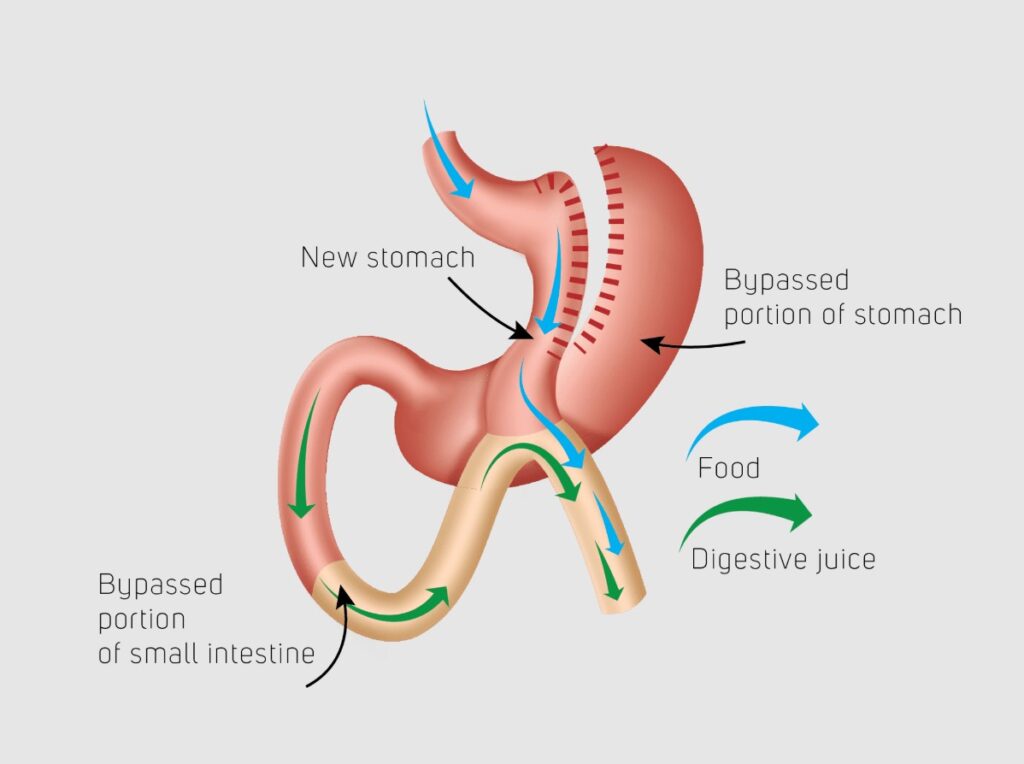The OAGB is primarily aimed at treating obesity and related health conditions such as heart disease, hypertension, sleep apnea, and type 2 diabetes. It is also a common revision surgery for those who haven’t achieved desired results with a gastric band or sleeve. However, individuals with acid reflux may not be ideal candidates, as the procedure can worsen this condition.
OAGB is generally recommended for patients with severe obesity, especially if other weight-loss methods have proven ineffective.
Is OAGB Surgery Right for You?
Patients are evaluated for OAGB based on the following criteria:
- Body Mass Index (BMI): Typically a BMI of at least 35, or 30 with an obesity-related condition
- Acid Reflux: Those with acid reflux due to a hiatal hernia may not qualify.
- Health Conditions: Conditions like type 2 diabetes or hypertension may require additional testing
- Lifestyle: Smoking and alcohol should be stopped at least 2-3 weeks before surgery
What to Consider Before OAGB Surgery
Once approved, patients work with a Patient Support Assistant (PSA) to prepare for OAGB, including a liver-fat-reducing diet. Patients must also:
- Discontinue vitamin K and hormonal contraceptives 30 days before surgery to minimise bleeding risks
- Avoid smoking and alcohol in the weeks before the procedure
- Fast for 12 hours prior to surgery
Before surgery, patients undergo consultations and comprehensive tests, including ultrasound, X-ray, and bloodwork, to ensure suitability.
What to Expect During OAGB surgery
OAGB usually takes under an hour under general anaesthesia. The surgeon makes four small incisions to insert a camera and surgical tools, dividing the stomach and creating a long, narrow tube-shaped pouch. A section of the intestine is bypassed and connected to the new stomach pouch, allowing food to bypass the main part of the stomach and a section of the small intestine.
Post-Surgical Considerations
Following surgery, patients receive blood thinners and stomach protectors to prevent complications. A specialised diet plan progresses through:
- Liquid-only diet phase: e.g., protein shakes, soups, herbal teas
- Puree phase: introducing blended foods
- Soft food phase: gradual reintroduction of solid foods, being careful to avoid the simultaneous intake of solids and liquids
Patients should avoid caffeine, carbonated drinks, smoking, and alcohol for several months and gradually increase physical activity as they recover.
Potential Risks and Long-Term Complications
While OAGB is generally safe, risks include:
- Immediate Risks: Acid and bile reflux, bleeding, infections, intestinal blockage, and leakage
- Long-Term Complications: Stomach ulcers, hernias, malnutrition, gallstones, and dumping syndrome (where food moves too quickly into the intestine)
Patients are advised to take lifelong vitamin supplements due to reduced nutrient absorption.
Advantages of OAGB
- Shorter, cost-effective procedure with minimal intestinal rerouting
- Reduced internal hernia risk and potential for reversibility
- Effective for managing obesity-related conditions, with hormonal changes that reduce appetite
- Significant, long-term weight loss outcomes
Disadvantages of OAGB
- Possible complications affecting the digestive tract
- Lifelong vitamin supplementation due to nutrient malabsorption
- More challenging endoscopy post-surgery
- Risk of bile reflux, infection, hernia, and ulcers
OAGB is a powerful tool for weight loss with proven health benefits. However, patients should carefully consider the benefits and potential risks with their bariatric team to help them make an informed choice.
What is the Cost of OAGB Surgery?
If you choose an OAGB with Bariatrics & Beyond the cost will be £3,800. This covers all surgical assessments, the procedure, three nights’ stay at Acıbadem Adana Hospital for yourself and a companion, plus a further night at a nearby luxury hotel to aid your recovery (as well as all airport-hospital-hotel transfers). The price also includes all pre and post-surgical dietary and medical support through our UK-based team of experts.

